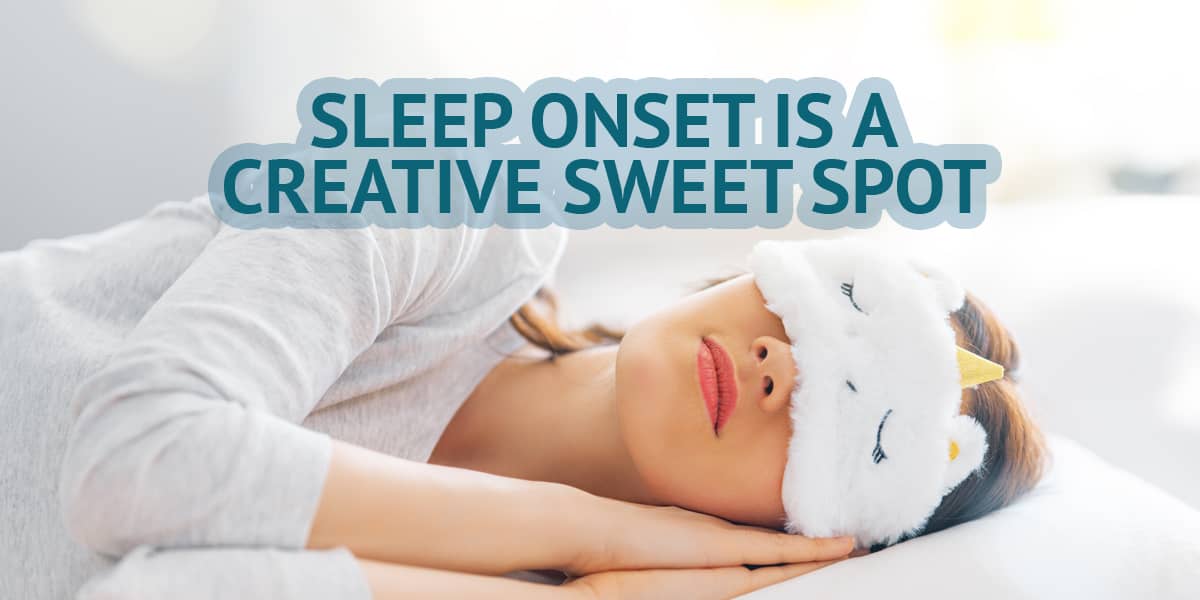Creativity has been a subject of mystery since time immemorial. From walking barefoot in the grass to tying their hair to a nail on the wall to going on pursuits of self-discovery, people have tried innovative ways to spark their creativity. But would you believe if I say that your creative brain awakens every night just before you slip into a deep sleep? That’s right. The latest researchers confirmed that sleep onset is a creative spot!
This is not a new discovery. The great inventor Thomas Alva Edison was a practitioner of this technique. It is documented that Edison would nap in his armchair holding a steel ball. As he began to sleep, his muscles start to relax and his brain entered the N1 phase, the ball would fall off on the ground waking him up. This, he believed helped him find solutions to several problems. Another practitioner of this stern method was Salvador Dali, the surrealist painter. He used to hold a heavy key in his hand during his nap time and the falling of the key would wake him up!
After a century, scientists probed into this state from where these great people derived their creative fluids. And recent studies revealed that sleep onset is a creative tunnel. Before I reveal the sweet spot of creativity, let’s understand what is sleep onset.
Also Read: Why do creative people spend so much time in the bathroom?
What is sleep onset?
Sleep onset is the stage between sleep and wakefulness when a person is transitioning from being awake to sleep. This is indicated by light sleep, somnolence, or drowsy sleep and is also called N1. It is a very short period that may start after 15 seconds of falling asleep and may last for less than 10 minutes.
N1 or sleep onset is the stage from which you can be awakened easily. In this stage the muscles are active, heart and breathing rates begin to slow, eye movements begin to slow. Body temperature begins to drop. In this stage, it is normal for a person to experience sudden twitches or ‘hypnic jerks. This is a sudden, brief muscle jerk that gives the sensation of falling from the bed. These jerks may or may not wake up the sleeping person!
Also Read: Can morning walk make you more creative?
Studies on the sweet spot of sleep onset
In a recent study, participants were given mathematical problems with a hidden rule in the sheet that helped to solve the problems. The participants weren’t told about this. The study found that people who spent at least 15 seconds in the N1 state were more likely to find the hidden rules. Their success rate was 83% as compared to the 30% success rate of participants who were completely awake.
It was also found that this superpower vanished when the subjects reached a deeper state. Thus, the study concluded that there is a creative sweet spot in the sleep onset period. However, it is important to hit off the perfect balance between falling asleep and not falling too deeply.
Creativity Sparks during sleep onset – A scientific explanation
Research reveals that sleep onset presents an ideal cocktail for creativity.
Neuroimaging studies of the sleep onset period revealed that N1 engages brain networks that are responsible for creative cognition, spontaneous thinking, and cognitive control. In addition to that, a person in the N1 state goes through involuntary, spontaneous, dream-like perceptual experiences. These are usually stemmed from recent wake experiences and past memories.
These hypnogogic experiences could be an exacerbated version of spontaneous thoughts that rambles through the mind and may foster the generation and evolution of new ideas. A study involving narcolepsy patients revealed that they exhibit increased creative potential because of their multiple frequent transitions towards sleep. Narcolepsy is a chronic sleep disorder that causes extreme daytime drowsiness and sudden attacks on sleep. A study also revealed that hypnagogic hallucinations as a key modulator of creativity in narcolepsy.
Sleep onset – A current of creativity!
During the N1 state, the executive abilities of the brain are not completely stopped. That’s why it is easy to awaken a person from this state. It is also for the same reason why people in this stage produce behavioral responses and claim that they were awake when awakened from N1.
Several such studies revealed that N1 is a “semilucid” state. The person is neither fully asleep nor fully awake. They begin to decouple from their environment and enter into a state of relaxation where their thoughts can flow freely and the mind is still conscious and has the logical ability to watch, identify and work on the creative sparks.
Sleep is the secret to success!
After years of testimony from some of the legends and tons of scientific evidence, researchers are agreeing that leveraging the creativity of sleep onset is the secret to success. Researchers also found that spending as little as 15 seconds in this stage could spark the creative wires in your brain. This is a very small window that can close if you wake up too early or fall into a deep sleep.
So, next time you are finding yourself entangled in a question hold a steel ball and try sleeping in a chair.

